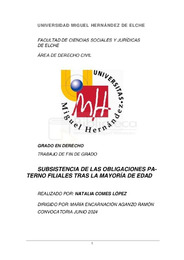Please use this identifier to cite or link to this item:
https://hdl.handle.net/11000/33247Full metadata record
| DC Field | Value | Language |
|---|---|---|
| dc.contributor.advisor | Aganzo Ramón, María Encarnación | - |
| dc.contributor.author | Comes López, Natalia | - |
| dc.contributor.other | Departamentos de la UMH::Ciencia Jurídica | es_ES |
| dc.date.accessioned | 2024-09-20T08:47:10Z | - |
| dc.date.available | 2024-09-20T08:47:10Z | - |
| dc.date.created | 2024-06 | - |
| dc.identifier.uri | https://hdl.handle.net/11000/33247 | - |
| dc.description.abstract | En el presente trabajo he tratado de exponer con detalle el panorama social que vivimos los jóvenes en la actualidad a la hora de encontrar un tra-bajo o conseguir independencia económica. Panorama caracterizado en la ma-yor parte de los casos por jóvenes que, alcanzada su mayoría de edad, todavía no han finalizado su formación y esto, unido a los elevados precios de las vi-viendas en España, trae como consecuencia que los jóvenes tarden cada vez más en abandonar la vivienda familiar. Seguidamente se analizarán las obligaciones paterno filiales que, ante esta realidad social, conciernen a los progenitores, sobre todo, una vez que los hijos hayan alcanzado su mayoría de edad y hasta qué momento deberán subsistir las mismas. En cuanto a dichas obligaciones, uno de los conceptos más importantes que trataré a lo largo del trabajo es la pensión de alimentos, el cual hace referencia a los gastos relativos al vestido, habitación, alimentación, educación, etc. de los hijos. Y todo ello será explicado en gran parte con respaldo en las numerosas Sentencias del Tribunal Supremo relativas a esta materia. | es_ES |
| dc.description.abstract | In this work I have tried to explain in detail the social panorama that young people experience today when it comes to finding a job or achieving eco-nomic independence. Panorama characterized in most cases by young people who, having reached the age of majority, have not yet completed their training and this, together with the high prices of housing in Spain, has the consequence that young people take more and more time more in leaving the family home. Next, the paternal-filial obligations that, in the face of this social reality, concern the parents will be analyzed, above all, once the children have reached the age of majority and until what time they must subsist. Regarding these obligations, one of the most important concepts that I will discuss throughout the work is alimony, which refers to expenses related to clothing, housing, food, education, etc. of the children. And all of this will be ex-plained in large part with support from the numerous Supreme Court rulings re-lated to this matter. | es_ES |
| dc.format | application/pdf | es_ES |
| dc.format.extent | 99 | es_ES |
| dc.language.iso | spa | es_ES |
| dc.publisher | Universidad Miguel Hernández de Elche | es_ES |
| dc.rights | info:eu-repo/semantics/openAccess | es_ES |
| dc.rights | Attribution-NonCommercial-NoDerivatives 4.0 Internacional | * |
| dc.rights.uri | http://creativecommons.org/licenses/by-nc-nd/4.0/ | * |
| dc.subject | Pensión alimentos | es_ES |
| dc.subject | hijos mayores de edad | es_ES |
| dc.subject | progenitores | es_ES |
| dc.subject | gastos ex-traordinarios | es_ES |
| dc.subject | patria potestad | es_ES |
| dc.subject | Alimony | es_ES |
| dc.subject | children of full age | es_ES |
| dc.subject | parents | es_ES |
| dc.subject | extraordinary expenses | es_ES |
| dc.subject | custody | es_ES |
| dc.subject.other | CDU::3 - Ciencias sociales::34 - Derecho | es_ES |
| dc.title | Subsistencia de las obligaciones paterno filiales tras la mayoría de edad | es_ES |
| dc.type | info:eu-repo/semantics/bachelorThesis | es_ES |

View/Open:
TFGNATALIA COMES.pdf
2,12 MB
Adobe PDF
Share:
.png)
